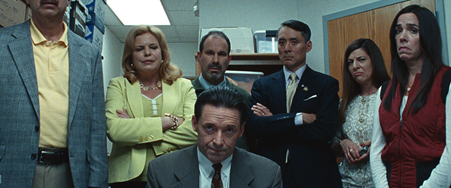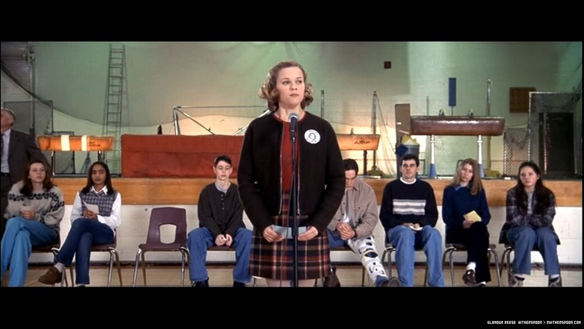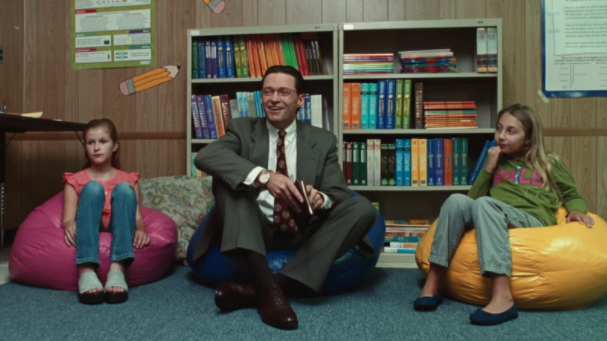We’ve reached a point where it’s difficult to believe that anyone is truly doing anything out of the goodness of their hearts. No public servants work hard out of a sense of civic duty, it’s safer just to assume that anyone working in the public sector is out, in one form or another, to enrich themselves. This cynical distrust of government employees often manifests as the conservative knee-jerk to slash funding as much as possible, any amount of taxes being paid representing nothing but highway robbery from freeloaders looking to rip off hard working taxpayers. Cory Finley’s BAD EDUCATION presents a nuanced contrast to this viewpoint, that even the people who do abuse the public’s trust don’t do so purely out of spiteful greed.
Hugh Jackman plays the delightfully complex Superintendent Frank Tassone of New York’s Roslyn school district, a man who keeps his many secrets carefully tucked away underneath impeccable suits and regular facelifts. Under Frank’s decisive leadership, the district has soared to the fourth highest-ranked public school district in the country, and Frank has bold plans to take it to number one. Unfortunately, just as he’s about to roll out a flagship skywalk for the high school, his deputy superintendent is exposed as having committed serious embezzlement against the school district.

We’re not mad, we’re just disappointed
What unfolds from there is a massive web of devil-in-the-details bureaucratic deceit whose scope is stunning. Particularly interesting is the choice to frame the narrative primarily from Frank’s point of view; we don’t know the full extent of his crimes, but we do want to view him as sympathetic. Screenwriter Mike Makowsky focuses on why a low-level bureaucrat would justify robbing the taxpayers, and while that does give Hugh Jackman the opportunity to play one of his most dynamic and conflicted roles in recent memory, it also cheats us of a wider perspective about the impact of Frank’s crimes.
It’s impossible to watch BAD EDUCATION and not draw parallels to Alexander Payne’s masterpiece ELECTION. Both films are about adults who view themselves as saints of civil service, who are slowly revealed to be petty monsters when challenged by an intrepid student. The difference, of course, is in the execution; Payne made a hyper-stylized satire of the foibles of American politics, creating a sense of a clash of titans between Tracy Flick and Jim McAllister, BAD EDUCATION keeps things relatively muted and tame by comparison, with less of a broad allegory about America as a whole presented in its narrative. Of course, this has a lot to do with the fact that Cory Finley was telling a true story, but it’s hard not to feel like Rachel, the intrepid teen reporter who methodically exposes Frank in the school paper, gets short shrift.

This movie deserves its own Tracy Flick
It’s an interesting risk to pin the majority of your narrative heft on your antagonist, and a lot of the most successful moments of BAD EDUCATION come when it slowly dawns on us just how much of villain Frank really is. There’s a lot to be said for being able to lay out your case against a man who is initially presented as deeply likable, so that we perfectly understand his motives even if they eventually become unacceptable. Merry-Go-Round contributor Kevin Cookman pointed out that the downside of putting so much emphasis on Frank is that we lose the perspectives of the people impacted by his crimes. Yes, we get some excellent scenes demonstrating how Allison Janney’s family and Frank’s domestic partner are impacted, but what we really could have used was more examples of how students suffer at the hands of Frank’s theft.

Hugh Jackman said “Fuck them kids”
In many ways, this is all nitpicking, BAD EDUCATION is very entertaining and part of a breed of movie we don’t get very much any more, “grown-up movies for adults”. A movie that takes a complicated real life subject and dramatizes it effectively feels like a rare treat these days, and BAD EDUCATION is certainly successful in everything it sets out to accomplish, it’s just a little disappointing that its ambitions weren’t greater. In the end, the message of the film seems to be about the necessity of holding everyone accountable, of trusting civil servants while also knowing that no one is above temptation. A story about theft and petty greed obviously has wide applications to our political climate as a whole, but BAD EDUCATION seems mostly disinterested in zooming out its scope. It’s perfectly compelling for a movie-of-the-week on HBO, but it’s hard to imagine we’ll remember much about the movie by this time next year.
















Comments